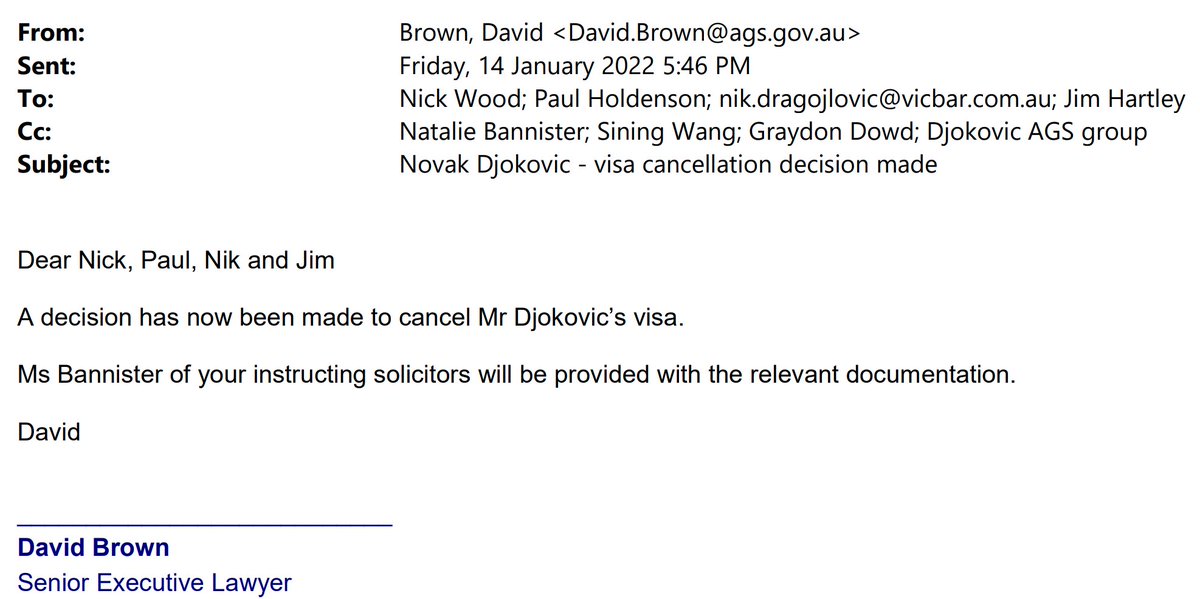267 page affidavit from ND team now up: fedcourt.gov.au/__data/assets/….
Reasons for cancellation are at pp 12-21 of the affidavit.
Hawke decided to proceed under 133C(3) without natural justice because of the upcoming Aus Open; the prospect of litigation; and the risk to health. ND will get his natural justice in court. 

Health background:
- current COVID wave with active, vocal, anti-vaxx minority
- ND isn't vaxxed and has recently had COVID (according to Serbia's systems.)
- current COVID wave with active, vocal, anti-vaxx minority
- ND isn't vaxxed and has recently had COVID (according to Serbia's systems.)

Hawke prepared to assume that ND entered Australia legally and has a legitimate medical exemption from vaccination. 

But ND is a health risk because he's a high-profile anti-vaxx individual (though the Minister hasn't asked ND about this.) What is important is how he is perceived by others, not his present views. 

So, Hawke thinks ND's mere presence may lead to:
- more people opposing vaxxes
- people who already opposes vaxxes being more committed
- a slowdown in Australia's booster programme
resulting in unvaxxed getting Covid, getting sick and putting pressure on the health system.
- more people opposing vaxxes
- people who already opposes vaxxes being more committed
- a slowdown in Australia's booster programme
resulting in unvaxxed getting Covid, getting sick and putting pressure on the health system.

As well, there's ND's 'apparent disregard' of the need to isolate if you have COVID, which may 'foster similar disregard', leading to new risks of spread etc.
(Hawke disregards the 2020 tournament because the bad behaviour that may not have been ND"s doing.)
(Hawke disregards the 2020 tournament because the bad behaviour that may not have been ND"s doing.)
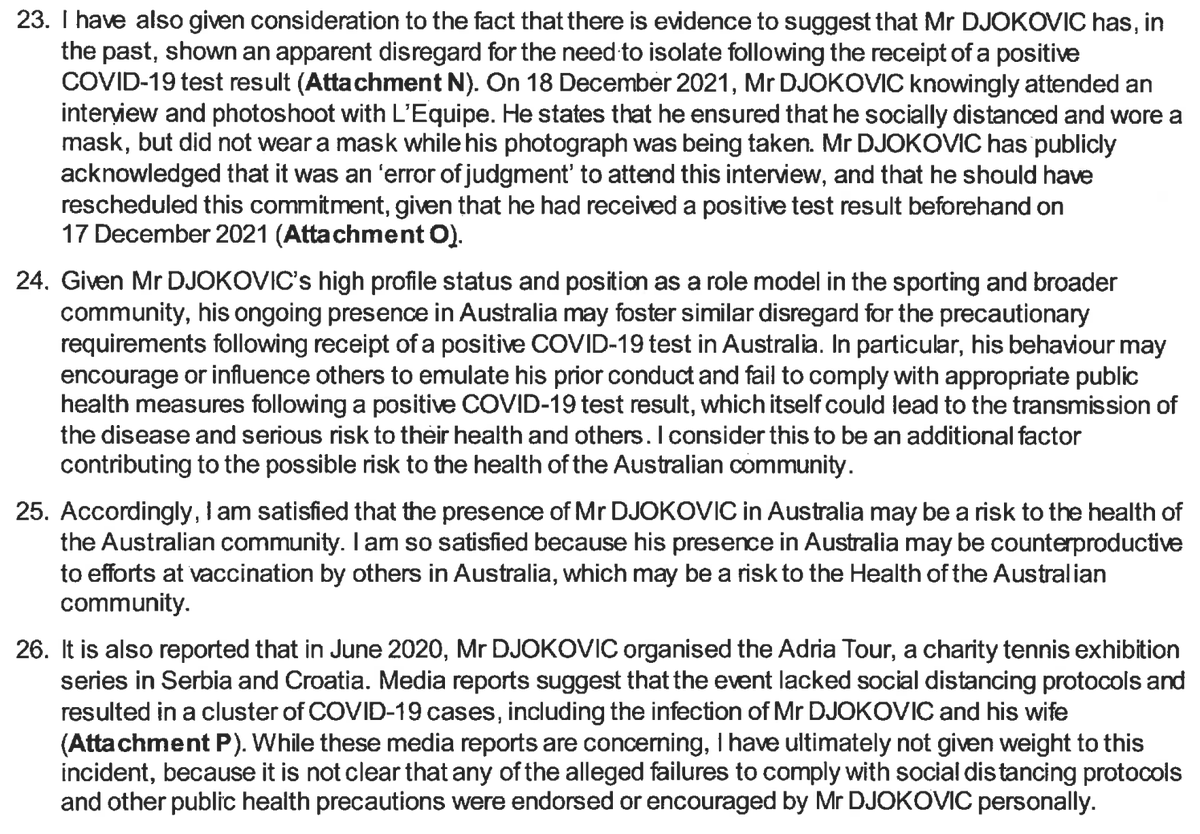
Separately and quite independently, there's also the risk to 'good order', because the presence of a high-profile unvaxxed guy may encourage others to disregard public health advice, including vaccine advice. 

There's also the possibility of a rise in anti-vaxx sentiment, which could lead to civil unrest and super-spreading rallies. 

Also, some people may get pissed off that ND is still here despite his lack of vaxxing and his non-isolating conduct, which could prompt discord and disruption during a pandemic. 

That's a wrap on s116. On to public interest.
It's consistent with the Aus Government's strong stance on vaccination to boot out a non-compliant, vocal, high profile anti-vaxxer who could encourage others to get sick and burden our health system.
It's consistent with the Aus Government's strong stance on vaccination to boot out a non-compliant, vocal, high profile anti-vaxxer who could encourage others to get sick and burden our health system.

Hawke's response to ND's subs:
- ND: I'm no health risk. Hawke: I know.
- ND: I've obeyed all the rules. Hawke: I know.
- ND: I'm of good standing. Hawke: I know.
- ND: People want me to play tennis. Hawke: Some do.
- ND: Melb might lose the Open: Hawke: I doubt it.

- ND: I'm no health risk. Hawke: I know.
- ND: I've obeyed all the rules. Hawke: I know.
- ND: I'm of good standing. Hawke: I know.
- ND: People want me to play tennis. Hawke: Some do.
- ND: Melb might lose the Open: Hawke: I doubt it.
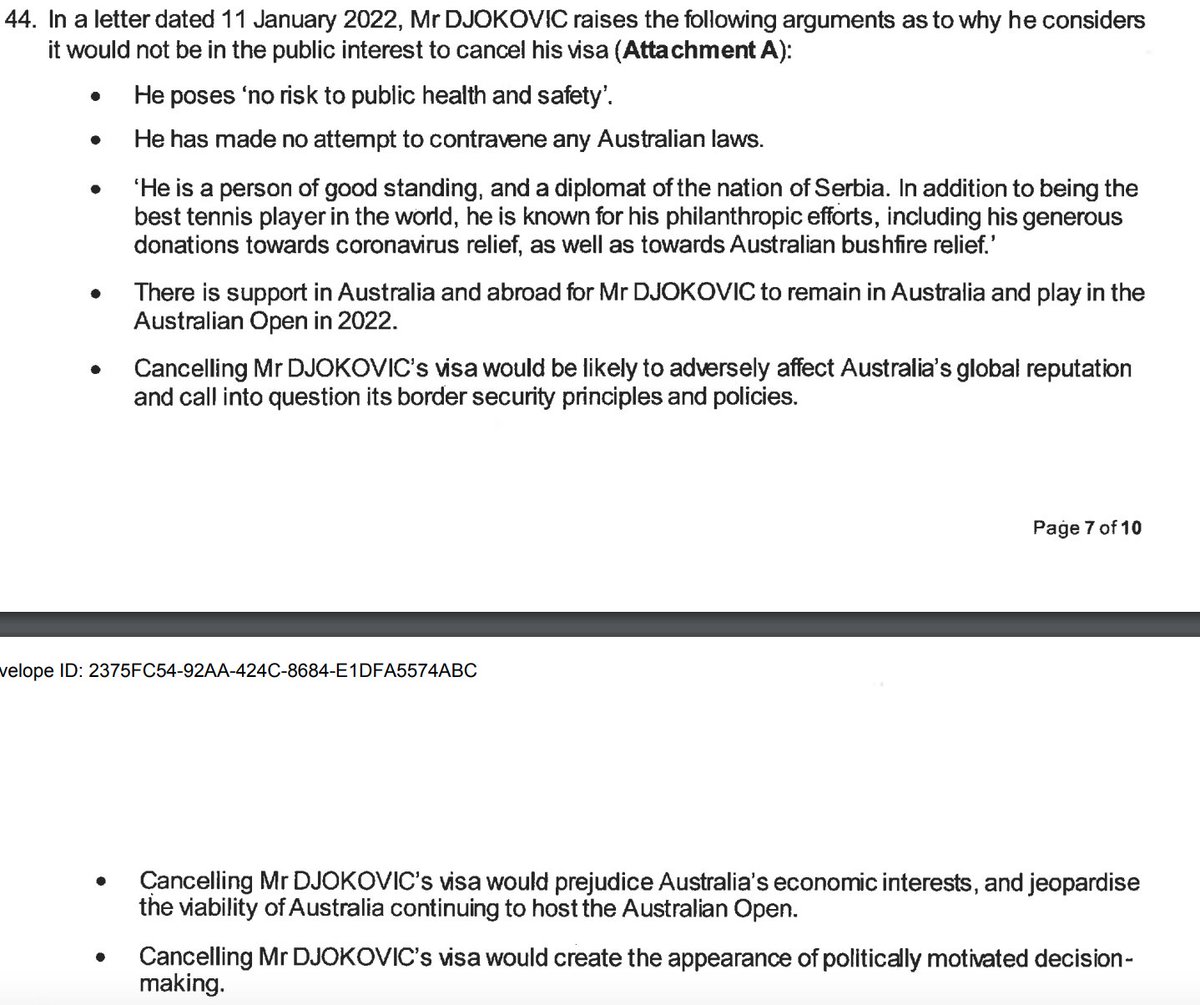
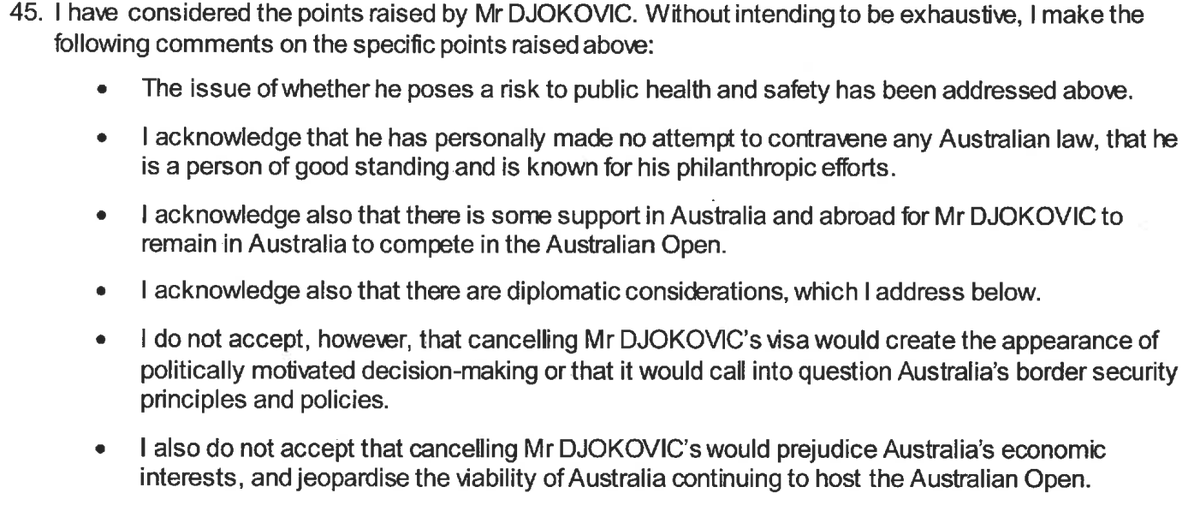
- ND: This politically motivated decision will be a bad look for Australia.
- Hawke: No way will anyone think this is politically motivated. As if! But I acknowledge that there may be diplomatic fallout. There are no international laws in play, but I agree Serbia will be pissed.
- Hawke: No way will anyone think this is politically motivated. As if! But I acknowledge that there may be diplomatic fallout. There are no international laws in play, but I agree Serbia will be pissed.

Hawke gets that the horse has partly bolted and that a cancellation will really stuff up ND, even though I now think he came here lawfully.
But it's all worth it for the better health of Australians.
But it's all worth it for the better health of Australians.

Hawke acknowledges that the fact that ND came here lawfully and is here doing exactly what he was given a visa to do are points in his favour. 

On that 'travel' thing, I accept that the error wasn't ND's fault - his agent has taken the fall.
But forms are SO important, so I reckon this is a minor reason to cancel, but I would still have cancelled without it.
But forms are SO important, so I reckon this is a minor reason to cancel, but I would still have cancelled without it.

Hawke agrees that a cancellation will harm ND economically, even though he has been totally cooperative with the department and has not had prior problems. Those are reasons against cancelling.
No-one else's visa will get cancelled, so that's nice.
No-one else's visa will get cancelled, so that's nice.

Hawke agrees that cancellation and 3-year ban will really stuff up ND's future tennis in Australia. That's a significant reason not to cancel. 
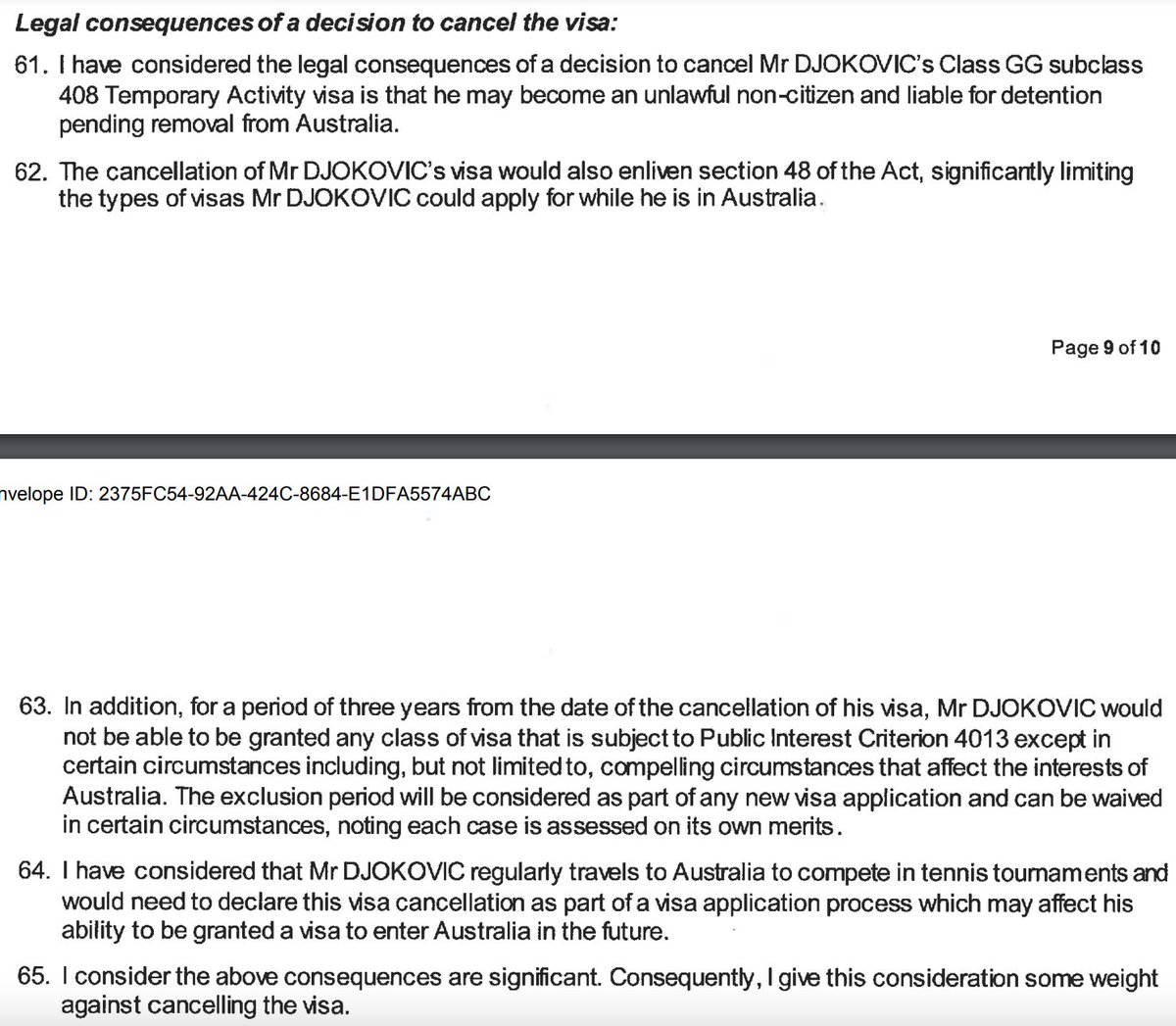
But, all up, health is more important. None of the factors against outweigh that, and Hawke would still have cancelled even if the sole issue was acting consistently with the govt's strong take on public health. 

That's it. It must be nice to make decisions like this without worrying about merits review.
Pp 22-26 are the department's advice to Hawke. Unsurprisingly, it's in the same terms as the reasons, and indeed the draft reasons (not included?) are an attachment.
Pp 30-36 are ND's lawyers' letter to Hawke.
The lawyers' cite ScoMo's 'rules are rules' stuff, and ask why ND isn't being treated accordingly.

The lawyers' cite ScoMo's 'rules are rules' stuff, and ask why ND isn't being treated accordingly.


They cite ScoMo's tweet, and point out that the only person who hasn't followed the rules so far is Karen Andrews. 

Most of the rest is ATAGI stuff, but there's also a public interest argument:
- an Age poll saying a majority want ND to stay, and also a petition
- the other stuff cited by Hawke about reputation and politics.

- an Age poll saying a majority want ND to stay, and also a petition
- the other stuff cited by Hawke about reputation and politics.


ND's lawyers want Hawke to be available for cross-examination at any hearing.
Apparently, Hawke promised to give ND notice within 30 minutes of a decision, and also promised not to deport him for at least 24 hours.

Apparently, Hawke promised to give ND notice within 30 minutes of a decision, and also promised not to deport him for at least 24 hours.


The rest is all documents we've seen before, and a bunch of attachments to Hawke's reasons.
Some of the attachments are really weird, out of context. (Actually just awkward pictures from online articles that are printed out.)

Some of the attachments are really weird, out of context. (Actually just awkward pictures from online articles that are printed out.)


Also, the medical articles ND sent to Hawke, which Hawke put aside because he now thinks ND won't infect anyone with Covid, just with bad thoughts. 

• • •
Missing some Tweet in this thread? You can try to
force a refresh

